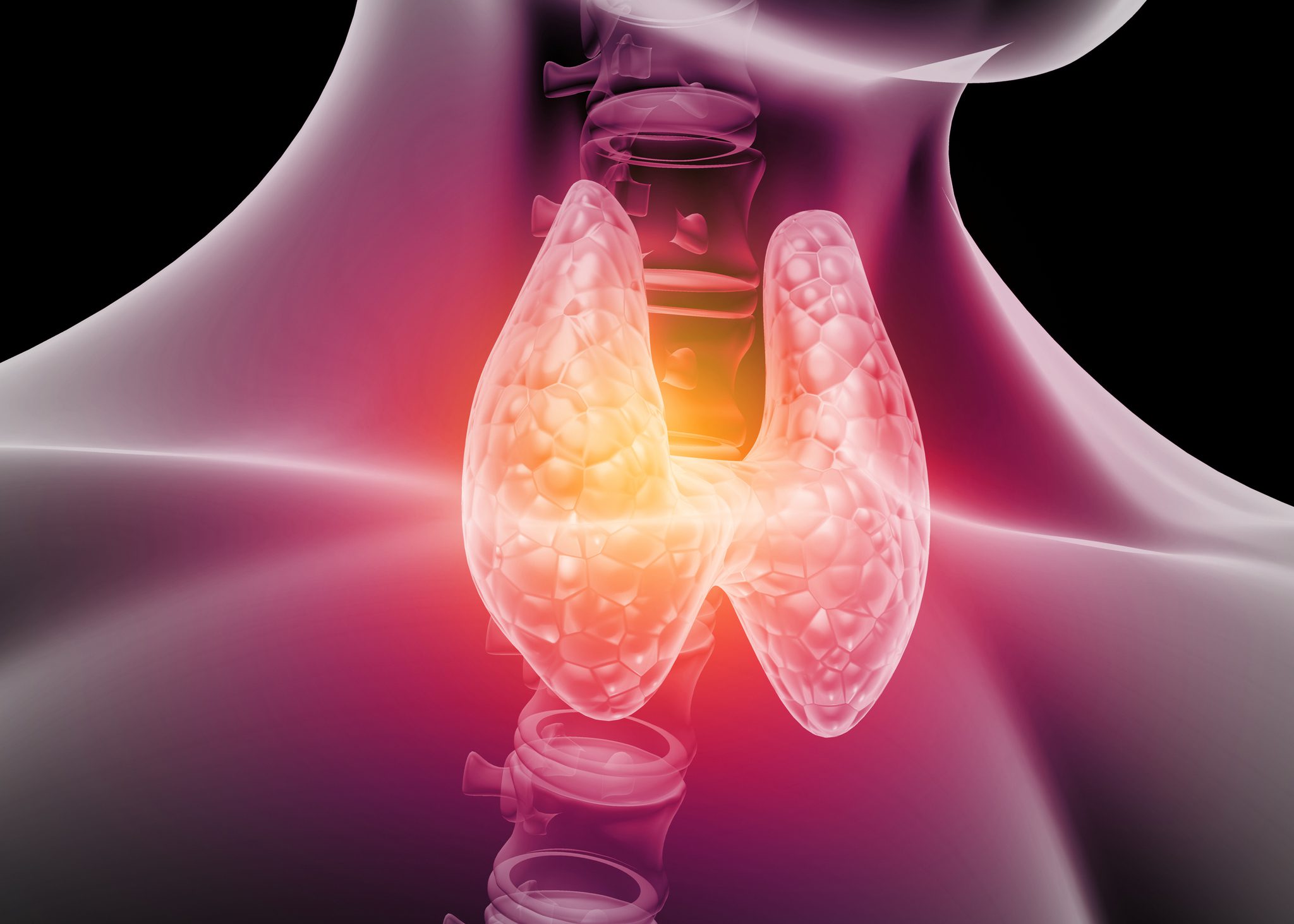Articles

Therapeutic Nutrition Before and After Radioactive Iodine Therapy
What is the thyroid gland?
The thyroid is a butterfly-shaped gland located at the front of the neck. It produces hormones that control metabolism, growth, and energy usage. These hormones affect nearly every organ in the body and maintain many essential bodily functions.
What Is Radioactive Iodine (RAI) Therapy?
Radioactive iodine (RAI), also known as Iodine-131, is a
form of iodine that emits radiation and is used to treat certain thyroid
conditions, including hyperthyroidism and thyroid cancer.
When a small dose of radioactive iodine is swallowed—either
in capsule or liquid form—it enters the bloodstream and is absorbed by the
thyroid gland, which naturally concentrates iodine. The radiation from
Iodine-131 then works to damage and destroy the thyroid cells.
When Is RAI Therapy Used?
- To
treat thyroid cancer that has spread or returned after initial treatment.
- After
thyroidectomy surgery, to destroy any remaining thyroid tissue that
couldn’t be removed surgically.
- To
treat hyperthyroidism if antithyroid medications fail.
What Are the Side Effects of RAI Therapy?
- Inflammation
of the salivary glands
- Dry
mouth and changes in taste
- Neck
pain and difficulty swallowing
- Nausea
Pre-RAI Dietary Guidelines
Before undergoing radioactive iodine therapy, patients are
typically advised to follow a low-iodine diet for about 1 to 2 weeks.
This helps deplete iodine stores in the thyroid, making the thyroid cells more
eager to absorb the radioactive iodine for more effective treatment.
What is Iodine?
Iodine is a mineral found in certain foods. The body needs iodine to produce
thyroid hormones, which regulate metabolism and other vital functions.
Foods to Avoid Before RAI Treatment:
- Iodized
salt, sea salt, onion salt, celery salt, garlic salt, or any foods
containing iodized or sea salt. These may be present in: chips, crackers,
salad dressings, ketchup, canned vegetables, and seasoned salts.
- Seafood:
salted fish, shellfish, sushi.
- Soy
and soy products: soybeans, tofu, soy burgers. Also avoid certain
legumes like red beans, navy beans, and white beans.
- Dairy
products: milk, cheese, yogurt, butter, cream, ice cream, whey, and
sour cream.
- Red
dye #3: found in processed red or orange-colored foods, candy, and
some supplements.
- Restaurant
and processed foods: choose fresh food instead.
- Egg
yolks
- Any
product containing:
- Alginates
- Carrageenan
- Agar-agar
- Iodates
Allowed Foods on a Low-Iodine Diet:
- Coffee
or tea
- Plant-based
milk (e.g., coconut, almond, rice)
- Fresh
or canned fruits; fresh or frozen vegetables
- Sugar,
jam, natural honey, maple syrup
- Unsalted
nuts and nut butters
- Fresh
or dried herbs, spices, black pepper
- Egg
whites
- Fresh
meat: beef or chicken
- Grains
and pasta made without high-iodine ingredients
- Dark
chocolate with at least 70% raw cocoa
- Homemade
bread made with non-iodized salt and oil instead of butter and milk
Post-RAI Dietary Guidelines:
The radioactivity remains in the thyroid for a short time
and decreases significantly within a few days. The full effect of RAI on the
thyroid gland may take 1 to 3 months, with maximum benefit between 3 to 6
months. Patients should follow a balanced diet that supports healing and
minimizes potential side effects.
Balanced Nutrition for Recovery:
Proper nutrition is essential for helping the body recover
after RAI therapy. A diet rich in essential nutrients promotes healing, reduces
side effects, and supports overall health.
High-Iodine Foods
After RAI therapy, there are no strict dietary restrictions
like those during the low-iodine phase. However, patients should avoid
excessive intake of high-iodine foods for the first few days
post-treatment, such as iodized salt, seafood, seaweed, and processed or canned
foods.
Hydration
Staying hydrated after RAI is crucial. Drinking plenty of
fluids helps reduce radiation exposure to other organs and aids in eliminating
the radioactive iodine.
Managing Common Side Effects Through Diet:
- Dry
mouth: consume moist foods (soups, smoothies), drink plenty of water,
suck on ice chips or sugar-free candy, eat frozen treats, or chew
sugar-free gum.
- Mouth
or throat sores: choose soft, moist foods that are easy to swallow.
Moisten dry foods with broth or sauce. Use a blender to make shakes or
purée foods. Avoid spicy, salty, crunchy, or sugary foods, as well as
alcohol and tobacco.
- Changes
in taste: avoid strong-smelling or sharp-tasting foods. Add herbs and
spices to enhance flavor. Mild foods like oatmeal, rice, or mashed
potatoes may be more palatable.
Vitamin D
Vitamin D supports bone health and is especially important
after thyroid treatment, as thyroid imbalances can affect bone density. Some
patients may need supplements if levels are low. Top food sources include egg
yolks, red meat, liver, oily fish, and sun exposure.
- References:
- https://www.mdanderson.org/cancerwise/radioactive-iodine-therapy–9-things-to- know.h00-159466368.html
- https://medlineplus.gov/ency/article/007702.htm
- https://my.clevelandclinic.org/health/procedures/radioactive-iodine-therapy
- https://www.cancer.org/cancer/types/thyroid-cancer/treating/radioactive-iodine.html
- https://www.mskcc.org/cancer-care/patient-education/low-iodine-diet
- https://www.thyroid.org/low-iodine-diet/
- https://www.cancerresearchuk.org/about-cancer/thyroid- cancer/treatment/radiotherapy/radioactive-iodine-treatment/preparing-radioactive-iodine- treatment#:~:text=You%20might%20need%20to%20have,level%20of%20iodine%20in% 20them.
- https://www.cancerresearchuk.org/about-cancer/thyroid- cancer/treatment/radiotherapy/radioactive-iodine-treatment/after-radioactive-iodine- treatment
- https://ods.od.nih.gov/factsheets/VitaminD-HealthProfessional/
- https://www.medschool.lsuhsc.edu/lungcancer/docs/diet%20and%20caner_a%20guide% 20for%20people%20with%20cancer_irish%20cancer%20sociey_boioklet.pdf
- https://www.cancer.gov/about-cancer/treatment/side-effects/mouth- throat#:~:text=For%20a%20sore%20mouth%20or,and%20make%20eating%20less%20p ainful.
- https://www.thyroid.org/low-iodine- diet/#:~:text=ONLY%20EAT%20A%20SMALL%20AMOUNT,shellfish%2C%20kelp% 2C%20and%20seaweed)
- https://sunnybrook.ca/uploads/Outpatient_Radioactive_Iodine_140116_a.pdf
- https://www.radiologyinfo.org/en/info/radioiodine#:~:text=Although%20the%20radioacti vity%20remains%20in,to%20six%20months%20after%20treatment.
- https://beatcancer.eu/resources/nutrition/article/nourishing-your-recovery-a-healthy-diet- after-radiation-therapy/
